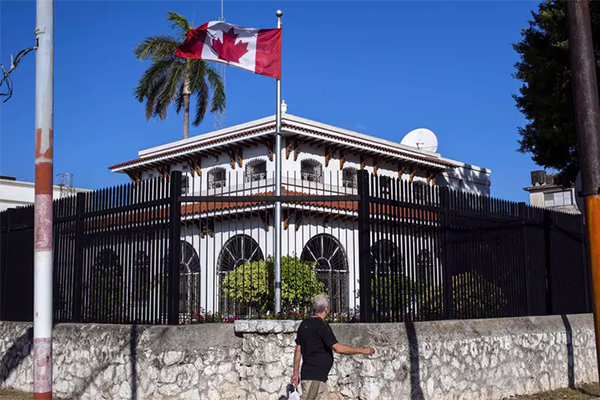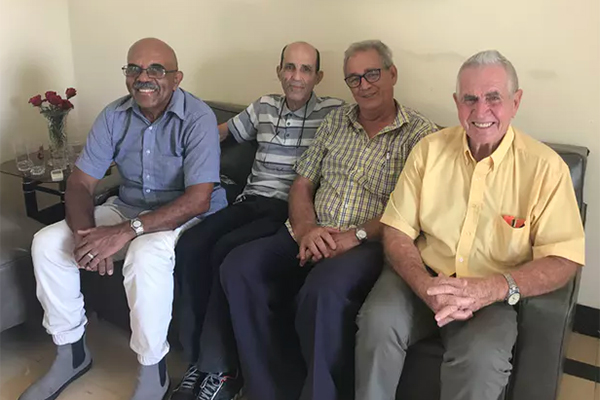Canada-Cuba relations take a sad turn with new visa requirements
July 2, 2019
Share

There has been some commotion about the Canadian government’s decision to suspend visa processing for Cubans in Canada’s Havana embassy that will require them to travel to a third country to obtain the document.
 The move is part of an overall staff reduction in the wake of an embassy employee lawsuit. Embassy workers believe the government failed to protect them from ailments sustained as a result of the mysterious “Havana syndrome” that has affected diplomats at both the United States and Canadian embassies.
The move is part of an overall staff reduction in the wake of an embassy employee lawsuit. Embassy workers believe the government failed to protect them from ailments sustained as a result of the mysterious “Havana syndrome” that has affected diplomats at both the United States and Canadian embassies.
Media reports, rallies in Canadian cities and a widely circulated home-made video released in Havana within days of the recent announcement all focused on the people most directly affected by this change. That’s because few Cubans, with their average monthly salary of US$30, will be able to travel to a third country to obtain the needed documents.
The personal stories highlighted in the video are brutal: Cuban students who can’t take up offers of admission to Canadian universities; Cuban–Canadian couples who must wait even longer to travel freely between their two countries; Cuban grandmothers unable to visit newborn grandchildren.
But this ugly turn in Canadian-Cuban relations has another casualty: decades of creative, productive connections between Cuban and Canadian people.
Canada’s official relationship with Cuba is well known. Canada pursued a different path than the United States. The Canadian government neither blockaded nor invaded. Pierre Trudeau and Fidel Castro went fishing together; Margaret Trudeau brought her youngest baby along to Cuba on a visit.
But formal political ties fluctuate. And Canada, no matter who’s in power, always treads cautiously in the shadow of Uncle Sam. Nonetheless, the story of Canada and Cuba also include countless, less famous but more enduring connections — in education, culture, non-governmental organizations (NGOs) and business, to name a few.
Canadian NGO arrived after revolution
The first international NGO Cuba invited in after the 1959 revolution was Canadian University Service Overseas, or CUSO.
CUSO opened a field office in Havana in 1969, and for more than a decade co-ordinated educational and technical co-operation with Cuban schools and research institutes.
CUSO’s most significant program trained a new generation of Cuban engineering professors. In the early 1970s, engineering professors from several Canadian universities taught short courses to technologically hungry Cuban students.
A group of English-as-a-second-language (ESL) instructors from George Brown College accompanied the group, quickly preparing the Cuban students to understand their Canadian professors. In addition, close to 100 Cuban graduate students came to Canada for three-month stints for consultation with their Canadian thesis advisers.
Canadians deemed the project a grand success. The final report and other CUSO documents, available at Library and Archives Canada, is a testament to grassroots development projects.
The project succeeded, wrote the dean of engineering at the University of Waterloo in 1977, because Canadian universities worked as “genuine partners” and did not set the agenda. “The solution to Cuba’s problems could never be found in any Canadian university…. It could only be nurtured in Cuba,” he said.
Noble words, but what did this look like from the Cuban perspective?
Learning opportunities still cherished
For a new book on Canada-Cuba relations, I recently interviewed retired engineering professors in Havana who got their start in the CUSO program.
They had all been trained by Canadian professors in Havana, and spent time in Canadian universities. They reminisced fondly about their student days in Toronto and Winnipeg, making inevitable jokes about the cold, but also spoke seriously about the learning opportunities they still cherish.

“In that era, we realized we needed to learn to resolve our own problems,” Juan Lorenzo Almiral told me. “The Canadian universities gave us the skills.”
Another example of co-operation can be found in the culinary world. Ivan Chef Justo is a well-known restaurant, located in an 18th century house in Old Havana. The food is the draw, but the décor is mesmerizing: a heady mix of photos, art and antiques drawn from Cuban history.
But there are also some oddities: an Ontario licence plate, a postcard from Montreal’s Expo ‘67, Canadian Indigenous art prints.
That’s because one of the owners, Justo Pérez, learned the restaurant business 50 years ago in Montréal. A friend of some of the Canadians who gathered in Havana as CUSO volunteers, Pérez spent a year in Montréal in the early 1970s on a self-styled educational tour of Montréal’s café and restaurant world.
His exit visa — an extreme rarity in those days — was organized by his CUSO friends. After a year, he returned to Cuba, opened the country’s first private restaurant in Varadero, and decades later continues to make his mark on the Havana restaurant scene.
Cuban music
Canadians, like people around the world, love Cuban music.
Luminaries such as singer Omara Portuando and musician Chucho Valdés grace all the important Canadian stages, and there are vibrant communities of talented Cuban musicians in all Canadian cities.
Cuban-Canadian musical ties extend for decades, beginning with bandleader Chicho Valle, who hosted the CBC Radio show Latin American Serenade and was the undisputed king of dance music at Toronto’s Inn on the Park in the 1960s and ‘70s.
Surely the most unusual musical exchange took place in the early 1960s, when Gaby Warren, a Canadian diplomat and now an Ottawa jazz celebrity, smuggled American jazz records into Cuba via diplomatic mailbags to nascent Valdés and Paquito d’Rivera.
Somehow when it comes to Cuba, the American absence rather than the enduring Canadian presence gets more attention.
But personal relations, friendships, joint projects and enduring mutual interests among Cubans and Canadians have created mechanisms for policy and social, economic and cultural development.
These are the connections — past and present — that are endangered by this ill-considered policy by the Canadian government.![]()
____________________________________________________
Karen Dubinsky is a professor of Global Development Studies and History at Queen's University, specializing in Canadian/Global South Relations, Canada/Cuba relations, Cuban cultural studies, Canadian history.
This article is republished from The Conversation under a Creative Commons license. Read the original article.
The Conversation is seeking new academic contributors. Researchers wishing to write articles should contact Melinda Knox, Associate Director, Research Profile and Initiatives, at knoxm@queensu.ca.